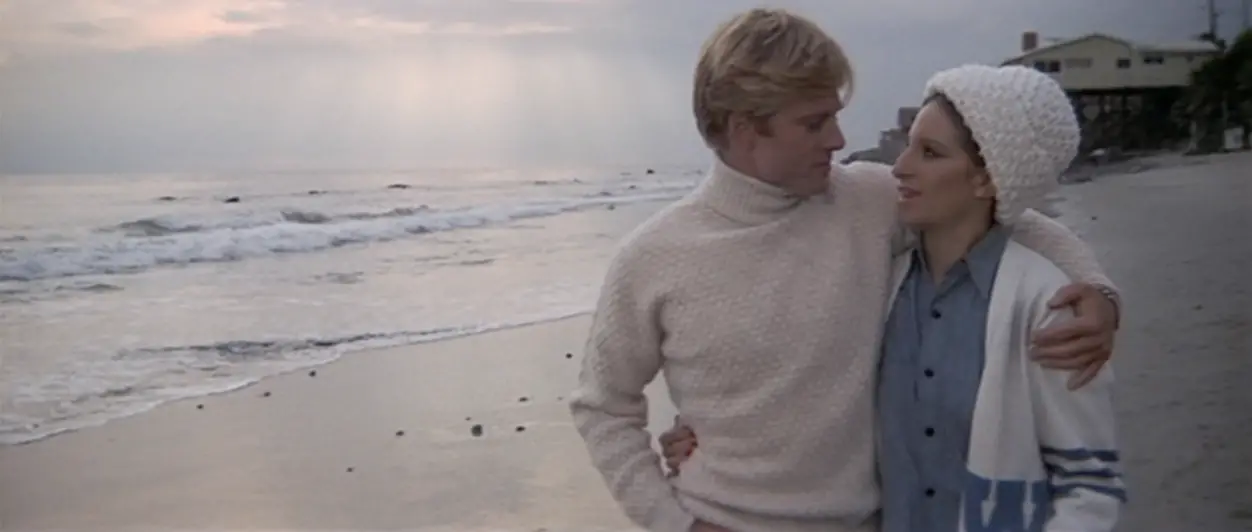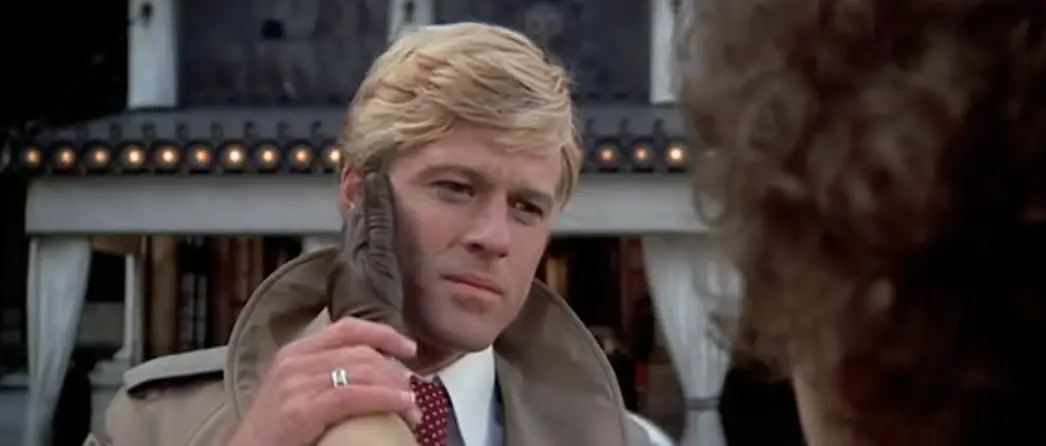
Director: Sydney Pollack
Producer: Ray Stark (Columbia)
Writer: Arthur Laurents (screenplay)
Photography: Harry Stradling Jr.
Music: Marvin Hamlisch
Cast: Barbra Streisand, Robert Redford, Bradford Dillman, Lois Chiles, Patrick O’Neal, Viveca Lindfors, Allyn Ann McLerie, Murray Hamilton, Herb Edelman, Diana Ewing, Sally Sirkland, Marcia Mae Jones, Don Keefer, James Woods
![]()
More than anything in plot, script or music, The Way We Were created such memories due to the collaboration of three key figures: Robert Redford, Barbra Streisand and the late Sydney Pollack. While George Roy Hill gave Redford a career in Butch Cassidy and the Sundance Kid (1969) and The Sting (1973), it was Pollack who molded him into the ultimate movie hunk, forging their careers alongside one another, from This Property is Condemned (1968) to Jeremiah Johnson (1972) to Three Days of the Condor (1975) to Out of Africa (1985). While Out of Africa won them Best Picture, The Way We Were remains their most enduring romance.
As for Streisand, the film earned her first Oscar nomination outside of a musical role (though she also sang the film’s memorable theme). As she and Redford both went on to their own directing careers in the ’80s — Redford with Ordinary People (1980), Streisand with Yentl (1983) — one can imagine them looking fondly back on Pollack as their pleasant memory of a true professional, pathos-packer.
Katie Morosky (Streisand) and Hubbell Gardiner (Redford) are friendly college acquaintances in pre-war 1937, but have little room to be anything more than that, simply because they are so different. Katie is an outspoken, liberal activist with a slight ugly duckling complex, while Hubbell is a handsome, popular jock constantly mocking politics with his frat pal J.J. (Bradford Dillman). Somewhere in their differences, though, the two manage to find redeeming qualities in each other, he for her gumption, she for his writing ability.
Such is what makes them happy to see each other when Katie bumps into him years later in 1944, she now a radio producer, he a drunk uniformed soldier ready to pass out. After an awkward night taking care of him, and climbing naked into bed with him, the two get the chance to test out a relationship that never was in college, though she constantly feels out of place amongst J.J. and his other foul-mouthed, apathetic Beekman Place friends.
The big step in the relationship finally comes when Hubbell is offered a Hollywood screenwriting gig to adapt his novel into a movie, and the two head out to the West Coast for a beachfront life. As U.S. history would have it, it’s the exact same time that D.C. was running rampant in investigating suspected Hollywood communists, a cause just right for Katie to fight against. When she organizes a group to visit Washington and protest the House on Un-American Activities Committee, Hubbell worries that she’s stirring up unnecessary trouble. Ultimately, their different worldviews bring their long, child-bearing relationship to a halt, leaving them only with “misty, water-colored memories of the way they were,” or I guess you could say, “misty, Watergate-colored memories of the way we were,” three years before Redford took down Nixon in All the President’s Men (1976).
The political division at the heart of the love story was highly relevant for audiences of 1973. In a way, the two lovers’ politics help to explain their entire relationship, beginning with an “opposites attract” spark and ending with irreconcilable differences. She believes in speaking up for good causes, in this case arguing that the enemy is “not the red boogeyman” but rather “anybody anyplace who will not stand up for world peace now!” He, on the other hand, believes that it’s all for naught, holding a deep cynicism toward politics as a web of double-talk contradiction:
HUBBELL: “This isn’t college. This is grown-up politics, Katie, and it’s stupid and dangerous. I’m telling you it’s a waste, that’s what I’m telling you, and that those men (the Hollywood Ten) and their families are only gonna get hurt and nothing’s gonna change. Nothing! And after jail, after five or six years of bad blood, when it’s practical for some fascist producer to hire some communist writer to save his ass because his hit movie’s in trouble, he’ll do it! They’ll both do it! They’ll make movies, they’ll play tennis, they’ll make passes at each other’s wives. Now what the hell did anybody ever go to jail for? For what? A political spat? … People are more important than any god-damned witch hunt. You and me. Not causes, not principles.”
KATIE: “Hubbell, people are their principles.”
As audiences, we’re left in the middle. Both sides sound fairly accurate, one side yanking at our hopeful idealism, the other at our jaded cynicism. The fact that such a rift would pull these two lovers apart is the greatest touch by writer Arthur Laurents, because he disables us from taking sides one way or the other, and thus we feel the sadness for the doomed relationship in the end.
And what an ending it is. The chill of New York. The bustle of taxi cabs. Streisand looking on with curly hair as her leather-gloved hand brushes Redford’s hair, caresses his cheek and pulls him in for a hug of warm memories and mutual understanding.

The image is one of the most famous in the history of movie romance, encapsulating everything that belongs to the film’s chart-topping title theme, the AFI’s #8 Movie Song of All Time. The lyrics can be instantly recalled by anyone who experienced the ’70s, its soundtrack winning a Grammy and two Oscars for composer Marvin Hamlisch, one for Original Score and another for Original Song. The latter was shared with lyricists Alan and Marilyn Bergman, who were together inducted into the Songwriters Hall of Fame in 1980 with three Best Original Scores to their credit: The Thomas Crown Affair (1968), The Way We Were (1973) and Yentl (1983).
It was no surprise that Streisand reenlisted the Bergmans for her directorial debut in Yentl, as they had provided her one of the great songs of her entire singing career in The Way We Were. Listen to the power in Streisand’s voice as she belts the line: “What’s too painful to remember, we simply choose to forget! So it’s the laughter, we will remember! Whenever we remember, the way we were.” It’s movie soundtrack magic.
That is, of course, if this sort of magic is your thing. Some non-fans may be nauseated by the thought of the song and a film they find as redundant as they do cheesy. What else is the explanation for the film’s 63% on rottentomatoes and 7.1 ranking on IMDB? The listology reputation is hit or miss. While holding a dominant #6 spot on the AFI’s 100 Passions, The Way We Were joins Arthur Hiller’s Love Story (1970) as the only Top 10 AFI Passions to be left entirely off both Tim Dirks’ AMC Filmsite Top 300.
Such stats beg the following question — if a film has such a great public reputation as one of history’s greatest romances, how can it be ignored in overall academic best lists? Are successful romances that far beneath other genres? Perhaps it’s because romances are like comedies, in that they present arguably the greatest variance in audience reaction. They are the two genres that can elicit such strong love and hate simultaneously.
If you’re one of the film’s fanatics, you’re not alone. If The Way We Were is so engrained in our culture, it can only be because it is so popular. Even those who’ve never seen it have encountered references somewhere in their lives, be it Sex and the City, The OC, Gilmore Girls, The Simpsons or That ’70s Show. The film’s pop culture place has become exactly that which it championed — powerful memories. Any flaws int he film have become too painful too remember, so we simply choose to forget. Instead, it’s the laughter and the romance we remember whenever we remember The Way We Were.
